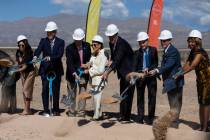High-speed rail costs
Perhaps one day, a high-speed train will be built within projected costs and bring all the utopian benefits of mass transit that proponents promised.
We’re nowhere close to that day. England is proving as much, even as the backers of a train from Las Vegas to Victorville, Calif., try to salvage their shelved application for a $5.5 billion federal loan.
A proposed high-speed train connecting London to northern England, initially estimated by the government to cost $20 billion, now might cost as much as $125 billion, according to a new report. Peter Mandelson, England’s former business secretary, wrote last month in the Financial Times that pursuit of the project was a “politically-driven” decision intended to “paint an upbeat view of the future.”
Recall that California’s proposed high-speed train between San Francisco and Los Angeles also has been plagued by cost overruns, even before the first stretch of track can be built. In 2006, the project was projected to cost $46 billion, including extensions to San Diego and Sacramento. By 2011, the San Diego and Sacramento extensions had been tabled because the Los Angeles-to-San Francisco route was coming in at $98 billion. Today, talk of a bullet train has been silenced, with the state pursuing a $68 billion line that shares track with commuter rail systems. Expect that price to go up.
Did we mention that California governments already are broke?
The proposed $6.9 billion XpressWest line from Las Vegas to Victorville one day would connect with California’s line. The fact that costs keep going up makes it increasingly unlikely that either will ever be built. They can’t possibly recover their construction costs. They won’t pencil out. Washington should invest in the West’s highways instead.























